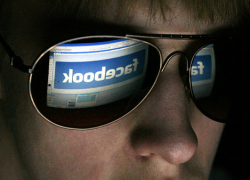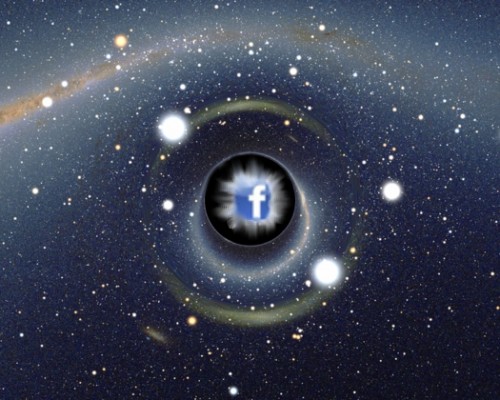The magnitude of damage that social media has done to our society, our relationships and our work ethic is immeasurable.
Let’s take a modest peek into the world of status updates, selfies and facades.
There are more than 945 million active users on Facebook today. Just over the 2014 New Year’s weekend, 750 million photos were uploaded. In 20 minutes 1,587,000 wall posts are written. People that use Facebook on their mobile devices are twice as active on Facebook than non-mobile users. In just 20 minutes 1,851,000 status updates are entered.
Now these numbers may seem unimaginable but believe me, they are real.
Here are five of the main reasons social media, most importantly Facebook, has been detrimental to the authentic human experience.
1. People ‘create’ themselves on social media.
We now live in a world where we get to choose how we are portrayed.
There are no longer in-person first impressions or telling handshakes. We now know everything about one another, before we have even made eye contact. We no longer have to meet people in a familiar social setting; we can type their name into a long rectangular box on a bright square-shaped screen and within seconds know their favorite books, hobbies, musical taste, birthdays and address.
If we look even deeper we can basically see their entire existence since they created their profile—past relationships, family photos, those horrible drunken college photos that they have long forgotten, photos of their pets—it’s all there.
That is of course if their profiles are searchable. And let’s be honest everyone is searchable these days. We have reluctantly given up our privacy in order to be accepted and known by our peers. It is rare that we meet an individual without a Facebook page. And when we do, how bizarre we feel they must be, to be so “disconnected.”
But are they really? Or do they know something that we do not?
We search one another’s profiles in order to get a sense of who we are. And this is the issue—most people are not displaying who they really are. They are displaying who they desire to be. And what this is doing is creating a false sense of identity between people. We have become so connected via web that we are extremely disconnected from our true realities and our true identities.
It is a choice. We have the choice to display truth, but it is human nature to heighten our sense of self.
We are all guilty of it. The complication with this is that we are so engulfed in our own projections that we actually begin to believe their deception as truth. And in being so convinced in our own lies, we actually begin to believe the projections of our peers and social circles.
This is not to say that we are all deceptive. I believe that we all want to be truthful about who we are and what we truly care about. But in that desire, some times we get lost.
Social media doesn’t have to be a negative implementation of communication, but sadly enough in most cases it seems to be that way. There are ways to use it positively. There are ways to use it to create inspiration and positivity. But somehow that idea gets lost among the masses, and in most cases does more damage than good.
2. These social media “personas” create jealousy, envy, and disappointment.
No one is happy, productive or successful in their pursuits 100 percent of the time.
And the ones that are, well screw them. Just kidding of course, congrats on your radness. But in truth, we present our best. Most people tend to leave out the moments that lack any sort of luster. We do not brag about our failures, our broken hearts, our job losses, our fat asses or our financial difficulties. Why? Because that doesn’t live up to the projection we created about who we are. So what does this do? It creates a false sense of happiness.
So now all of our friends think our life is perfect. We have the great job, we have freedom. We must have more money than they do because we look so much happier, we are more fit, so we seem more healthy as well. Overall we are better than they are. Their lives are now disappointing because all they are reading all day is our happy statuses and photos of us on a beach, a mountain, or doing yoga somewhere. And they are sitting at a desk.
The truth is no matter how many friends we have or photos we post doing something super stellar or of vegan food to show everyone how healthy we are, we still have days where we are lonely.
There are days that we are not doing something super stellar, there are days that we lay in bed all day thinking about the failure of our past relationship or eat cheeseburgers and chocolate chip cookies. But believe me when that is us, we are not going to post about it. Why? Because of course…that’s embarrassing and we want to be cool. Duh.
So don’t let Facebook, fool you.
No one is as perfect as their Facebook page. I am not, you are not, your ex boyfriend is not, your colleague is not, that girl from high school that made you feel like Daria is not. We are all in this together. We are all trying to do our best, to be our best, to present our best. But how about this?
When we are feel like crap, don’t go cruising around Facebook for some self-pity.
No one online is going to make us feel better—they are all going to make us feel even more crappy because we, ourselves, are not happy. And how do we get happy?
Start to be active, initiate, create, and produce. Go ride a bike, do yoga, stop eating cookies, dance, have a conversation with a stranger (before you stalk them on Facebook), jump out of a plane, try something new, go on a date with a guy that’s nice to you, and not one that looks like Heath Ledger, and has 5,000 friends on Facebook.
And for god’s sake don’t take a photo of it, and post it on Facebook to show other people you’re happy. Just put it on Instagram instead. That’s what all the cool kids are doing these days anyhow.
3. What’s happening in the world? People aren’t watching the news anymore?
Most people have switched from reading or listening to the news in the morning, to scrolling through their status feeds to see what is or is not happening in their social circles. It’s an automatic. Think about our mornings. What is the first thing we do? We hit the snooze button, we finally get up, we make coffee, we sit in front of the TV, and now instead of watching it, we pick up our phone and check our Facebook page.
We are all guilty of it. But what is the damage here?
No one knows what is happening in the world anymore unless they have a Facebook app on their page that links them to a News page. No one is reading the paper or watching the morning news.
For such an intelligent society, we have quickly given a lot of our personal power and time to social media.
We need to discover our patterns—how often we get online and watch ourselves for a couple of days. If our usage doesn’t worry us, we are luckier than most. But if we find that we are spending hours of our time on a website, we need to click off of Facebook… and surf for something a bit more advantageous.
What are your hobbies? What did you do before you spent all your time on Facebook? Search tips for those hobbies and then go do them. And watch the news—be aware of what is happening in your real world. I promise you your Facebook newsfeed isn’t the kind of news that you really need to know.
4. We are losing the authenticity of real life relationships.
We are so connected, so dialed in, so available…that we are not.
Relationships are so fast paced now, there is no trial period. We hang out, post photos, begin to like one another’s posts at a maniacal pace. We leave sweet messages on one another’s walls. Soon our friends are posting “adorable,” “perfect couple,” and “awwwww” on our photos. Soon everyone is aware of who is with who.
But who is that for? Who are we posting these things for?
We literally stalk one another. We know absolutely every single thing about the person we are dating before our first date. We judge one another on photos we post, articles we share, information we don’t share and how much we share. And what we post is taken differently by every single user that scans our page.
Our friends see a photo of us with a guy or girl and think friend. Our significant other sees a photo of another guy or girl and immediately becomes jealous. Other friends see these photos and become envious that they are inadequate because they do not have more photos with friends—and it becomes a vicious cycle. We can no longer post just anything without assumption soon following.
Interesting fact: a third of all divorce filings in 2011, contained the word Facebook. What the hell is wrong with people?
We are losing our connections to one another and we are losing our connections to our world.
We are so afraid of reality that the only eye contact we make is with our smart phones. We don’t have relationships with one another anymore, we have “threads.” We don’t have dinner nights with our friends anymore, we have private group pages. We don’t go on dates anymore, we like each others photos and profess our true love by linking our profiles together with the “in a relationship” status.
And the thing is, we actually get pleasure and acceptance from these shallow human connections.
There have actually been scientific studies done on how Facebook affects our brain activity. It has become a drug, an addiction. But no one treats it as such, because it’s just a website, right?
The truth is the organic chemical neurotransmitter in our brains called dopamine is released each time we get a poke, or a comment on our status, or a like, or a comment on a photo. We are being rewarded in a way—our brain has been wired to believe it should be happier now.
I am no less guilty than the rest, if anything I researched this because I feel that I need to awaken myself from this false belief that we have so openly accepted.
People need to have real life relationships. Human interaction has become so filtered. We judge people on their online personas before we’ve even met them. We do not give one another a chance for a first impression. We have become so judgmental due to our, shall I say dis-enlightenment in this internet age.
 5. No one works, studies, or interacts without distraction anymore.
5. No one works, studies, or interacts without distraction anymore.
I remember growing up in an age before smart phones, laptops, and Facebook. I will refer to this age as the age of Attention. Now-a-days we can not make it through a conversation, a work day, a book or a chore without checking in online.
We are all dialed in, every day.
My days in an office job are long past, but I remember the cubicle life. The only thing that made it conceivable was Pandora, GChat, and Facebook. Without those three things I would not have lasted a day. I would have been either asleep at my desk, cruising Craigslist for other jobs, or standing at the water cooler talking about my colleagues.
Most people working at a computer will have multiple tabs open, and in most cases, one of those is Facebook. And now Facebook has made even easier for us to stay addicted—they added chat. We don’t need GChat anymore, we just need a Facebook profile and it will kindly display all of our friends that are online in the right side of our window. It’s always open, and there are always dozens of people readily available to talk. So there you go, that’s what I’m going to do at work. I mean who works anymore? I have to catch up with Scott, Andy, Kevin, Sarah, and Allen. I just really do not have time to work.
How about this: if we want to catch up with those people, we spend time with them when we are done working and when they are done working.
And seriously guys, birthdays. Are you kidding me?
Facebook now tells us when everyone’s birthday is. We don’t have to be good friends anymore, or good girlfriends or boyfriends, or good siblings… Facebook does it for us. It reminds us everyday when someone’s big day has arrived, and it even allows us to send digital gifts. Give me a break, this is ridiculous.
People need to be more responsible for their personal relationships. Do we really want 3,000 Happy Birthdays posted on our Facebook wall? We want to celebrate with our friends. We want to be surprised. We want to see our friends’ faces. So how about this: on your friends birthday, call them, pick them up, go rock climb or skydive, go to dinner…go do something. Don’t post how much you love them and hope they have a rad day. It’s lame, and impersonal. Be a person, not a robot.
So there you go. There are 5000 other things we could talk about and complain about, but the truth is Facebook is not responsible for our deception, we are.
We took a great “tool” that was created to connect one another and we used it irresponsibly.
I use Facebook because it connects me to my friends from all corners of the world, to long lost family members and to clients that I deal with in my freelance business. For all those purposes it serves me well. It is when we abuse its power and use it for what is not necessary, that we fail. And no one is to blame for this except for ourselves.
We are all guilty of it, that is the point.
I take a pledge to move forward and reconnect with my work ethic, with my loved ones, with my friends, and with myself. There is always need for improvement in a fast-paced and technological world. We need to remind ourselves that above all we are still human. We are not automated devices, we are not robots, we are not mindless drones—unless we choose to be.
Love elephant and want to go steady?
Sign up for our (curated) daily and weekly newsletters!
Assistant Editor: Zenna James/Editor: Catherine Monkman
Photo: elephant archives







Read 1 comment and reply